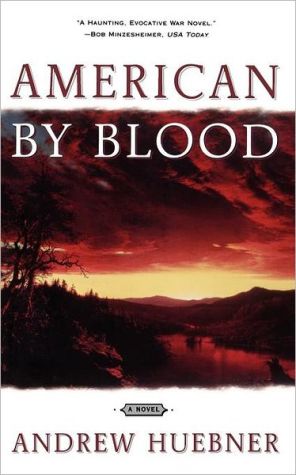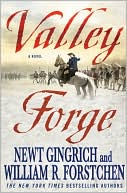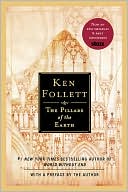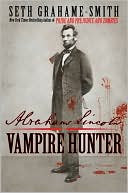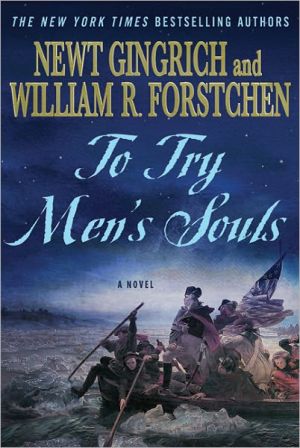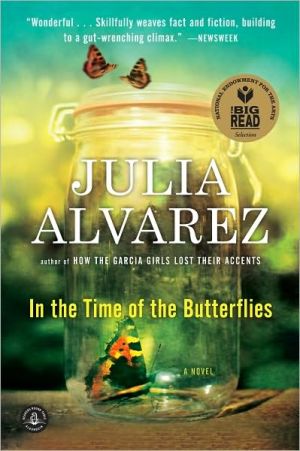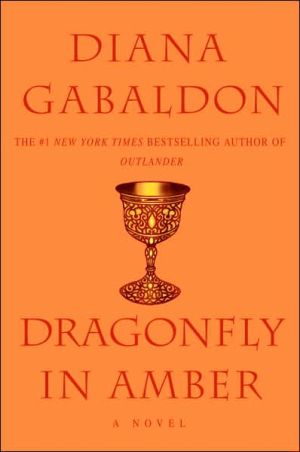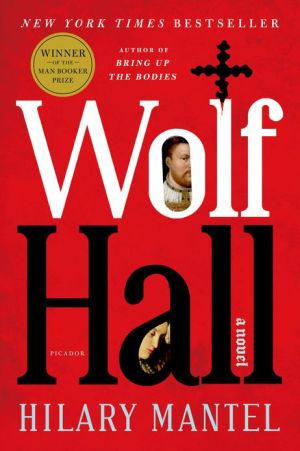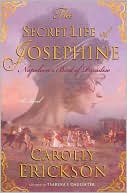American by Blood
In American by Blood, three U.S. Army scouts arrive a day late to join General Custer at Little Bighorn. They come upon the ruins of the Seventh Cavalry, a trail of blood and corpses defiled by wild dogs and swarms of flies. It is a scene that will haunt them for the rest of their lives. With the loss at Little Bighorn, the three men find their mission to help clear the land of Indian tribes becoming one of vengeance. As they journey into the dense forests and high plains of the Old West,...
Search in google:
Three U.S. Army scouts leading an infantry column arrive a day late to join Custer at the Little Bighorn. They come upon the ruins of the Seventh Cavalry, a trail of blood and corpses. It is a scene that will haunt these three young men irrevocably.Publishers WeeklyOne of the biggest mistakes an aspiring writer can make is to become grossly enamored of a well-established literary figure. Huebner's first novel shows a clear admiration of the sometimes quirky but highly recognizable style of Cormac McCarthy and thereby undermines what could have been a marvelous, horrific tale of vengeance and pathos in the aftermath of the Little Bighorn Massacre. At the opening, James Bradley--documented as the first officer to discover the ravages of Custer's Seventh Cavalry--rides onto the bloody battlefield accompanied by two privates, William Gentle and August Huebner, the author's great-great- grandfather. The men report the result of Custer's strategic blunder, then continue to try to track down the hostile Sioux and Cheyenne and ultimately the Nez Perce, as the Indians fight a running, retreating series of battles across the mountains and prairies of Montana and South Dakota, trying to escape to Canada. The soldiers form a triumvirate point of view, with Bradley as the voice of duty, Huebner the voice of reason and Gentle (the soldier credited ultimately with the murder of Crazy Horse) the voice of mystical frontier pragmatism. Punctuated with beautiful descriptive passages of wilderness flora and fauna, the novel graphically details the skirmishes that followed the military disaster on the Greasy Grass, revealing with rare candor the inner thoughts of American troopers involved in a deadly struggle with a desperate foe. Unfortunately, Huebner's decision to eschew conventional punctuation, his verbal anachronisms and a few outright historical errors (the Comanche were not at Little Bighorn) render the story difficult to follow. Huebner clearly has McCarthy's rhythms down, but unlike the older writer, Huebner doesn't quite get the melody right. And that's a pity, for he certainly has an original and potentially inspiring lyric in mind. Copyright 2000 Cahners Business Information.\|
Chapter One\ They rode up over a trail to a rise with the three scouts in the lead. As they passed through a patch of juniper trees, the sun turned hot and the very air around them, with the sawing legs of the hoppers and the twits of the birds, seemed to hum with heat. Before them was a valley now with dew burning light on the spots of dying, browned grass. Tall sprigs of Queen Anne's Lace caressed the horses' legs and speckled the soldiers' boots with their sex.\ Coming over a rise they saw the white things on the hills. Bradley's horse snorted, hesitating, sniffing the air. He kicked it on ahead.\ Hah, he called to it.\ No one else spoke.\ Not even Shit, what in the hell, or Goddamn.\ Maybe it was the smell, or the flies, or the wild dogs. The dogs were everywhere, they darted under the legs of their horses. They yelped wildly at their horses and gnawed brazenly at their boots. The soldiers kicked at them and hollered. The dogs had blood on their yaps. Their eyes rolled back white in their heads.\ There were so many flies. A fog of them attacked the Private called Gentle, his eyes, nose, in his mouth when he yelled and cursed, kicked his horse's flank and rode through it.\ The smell was like a film that permeated their souls through the pores of their skin. They drew their hankies and bandannas from their saddlebags and tied them around their noses like bandits. Their necks pricked and their backs tingled. From the south a crow cawed, then another. The big, black birds flapped overhead, close enough to Gentle that he could hear their wings. He ducked as they passed. When he looked around, no one was watching.\ The Lieutenant's lead point, Private August Huebner,was the first of them to spot the dead. As he rode alongside the river he saw a horse and looked that way.\ Its labored breathing sounded raw and strange, head all swelled, an empty eye-hole, leaking pus. Bradley drew his pistol and shot it. His hand shook a bit, and he had to use the other to steady.\ Keep your eyes open, he said.\ Dried blood had flowed in a path into a pond-like place, had turned the land under them black. Their horses stepped lightly on it, like they were walking now on some new surface.\ There was blood in the dirt in sticky dark pools around each of the fallen that gathered in rivulets, recedes and indents of the landscape. There seemed to be blood even in the sky and wind. The scouting party had the hankies over their noses for the smell. They closed their eyes. Some of them retched right off their horses. They could not guard or flush their hearts.\ Huebner saw a patch of wildflowers, purple and white wisteria, speckled with blood, bits of bone and brain in a perfect burst of color from the crown of a man's scalped head. He swallowed and kneaded his horse past.\ Hands, heads, torsos, feet and legs, eyeballs, fingers and cocks cut off and scattered about, stiffening into grotesque and obscure mockeries of life. Birds hovered overhead, squawking horribly. The bodies were bloodied, swollen and discolored from two days in searing sun, covered by pulsing masses of flies. Three crows raised their heads lazily, like black princes at a castle feast, when Huebner kicked at them. Gentle's bullets buzzed past his shoulder, exploding each of them into a cascade of feathers.\ A Bible had been ripped apart, strewn to the wind. They saw odd pages, stuck to bloody scalp-shed faces, floating in the hot breeze. Bradley tried to gather them up, got a pile together then stopped and threw them up in the air. It seemed really important at first, then it wasn't anymore. The bodies were left for rot on an earth tired and scarred by the fury of their dying.\ They separated, the five of them in the scout party. They got off their horses and led them by the bridle, petting their noses and whispering in their ears. A man with his face peeled off and hanging: lips, nose cartilage and one eyeball hanging by a strand from his naked jawbone. Ancient, unknown markings were carved in his naked, hairless chest.\ They had to fight off the wild dogs. They were feeding, the nasty bastards. They'd laugh, this terrible ear-splitting screech. Gentle, raising his rifle, got off four rounds at them, hitting two before Bradley tapped his shoulder.\ That'll be enough of that, soldier, he said.\ Private August Huebner pulled a man's teeth open and pushed his tongue back between them, and lay the head on a mound of grass. He felt like he had to do something. Another had died in a crouch, his mouth wide open. The top of his head brown, dried blood. Huebner tried to close at least his eyes, gently stroking the lids shut. He couldn't straighten out the body. The limbs were stiff, blue and hard. From the soldier's tightened fist hung a silver chain broken off as if in a last fight for its possession, or a last prayer. The Private left him just like that.\ The sun moved behind a bank of clouds, and for a few minutes the morning became as dark as dusk. The men took their nervous horses to a gathering of trees and tied them there. A soft breeze blew on Bradley's sweat-soaked neck and shoulders. His horse tittered and he rubbed its hot flank with cool dirt taken from under the shade of the trees. When he looked to the distant mountains, purple in the hard light, a thousand fragments of rock shimmered like glass in the brilliant sunlight.\ It was noon, the hottest part of the day. Bradley thought they should get back, but the thought of leaving made his stomach tingle. Everyone would wonder where they were, if something had happened. Then he forgot. Thirty minutes later he thought of it again and called over Huebner.\ Ride and get the others.\ Sir?\ Huebner looked dazed, his eyes far-off.\ This ain't what we come for, sir.\ The words came from Huebner all at once. From the quiet Private it took Bradley by surprise.\ Told us one white man was worth twenty-five Indians out here. Going to be like hunting.\ Huebner stopped talking as suddenly as he'd begun. He looked down at his own hands, at the blood on them. He couldn't look Bradley in the face.\ Take Brackett and Taylor! Bradley shouted, but he didn't know why. I'll stay here with Gentle, he said. Tell the Colonel what we've found.\ For a moment Huebner just stood there nodding. When he finally turned his head, Bradley could tell he'd been crying. Huebner started to speak, but Bradley cut him off.\ It's all right, Bradley said. Just go.\ When they left, the Indians had burned brown the grass. Huebner and the others rode past the dead, some alone, others in groups, all of them stark white except their hands and faces turned dark by the sun. The three riders' shadows played out long over the sagebrush, dusty earth and the grasshoppers that flitted about by the score with every step their horses took. Huebner rode ahead of the others. Alone for a few moments on the dusty plains, he let his horse guide him back.\ They done told us to come out here with y'all and scout for the battle, to back up Custer, Taylor said. He spoke with anger in his voice, a man who'd been lied to.\ He don't need no back up, Brackett said. He worked his lips like he wanted to spit, but his mouth was dry.\ Huebner reported to Colonel Gibbon and his staff, who, unbelieving of the words from his mouth but not the truth read on his solemn and wild-eyed countenance, set out themselves ordering an escort of fifty volunteers. Word got around. By the end of the day they all came, a straggling, incredulous entourage that stretched across the five miles from camp to the battlefield, pilgrims called to witness the defeat and demise of one of their own beliefs.\ At most there were a half-dozen spades and shovels, picks and axes in the company. The soil was dry and porous. Shallow graves for a few, but most they just covered with brush or dirt, left them to the wild dogs and wolves.\ The living became something else, stepped out of the lives they'd known and into others. They would never look at anything close to them, their mothers and fathers, brothers, sisters or their lovers, their old ragged first toys, the same.\ Their lives long they tried to find what they had lost on that hill. Later, drunk, around fires they talked about what they could not, something in all the barrooms and prayer houses of their collective destiny they could never express. Maybe they knew this, but they talked anyway. They wanted to maintain at least the appearance of sanity. They said things like:\ Goddamn.\ It was just a big, open-air slaughterhouse.\ It was like riding straight on into hell.\ Copyright © 2000 by Andrew Huebner\ Chapter Two\ A north wind whipped the air down in the Medicine Tail Draw, ran it back against the face of the mountain. Nothing to burn but dead grass, sagebrush, seedling scrub pine. None of it caught real good, the smoke made matters worse. Gibbon's men had marched fifty miles in the last three days to join forces with Custer and come to find this.\ They could not escape the smell. Bled their noses dry, tickled their brains silly. They soaked their bandannas and hankies in cold river water, laid wet cloths over their faces. Sleep came fitfully. Hard ground, dusty cyclones, sticker bushes and dirt mites. They cursed their devils and slapped their own faces. Fat, blood-laden mosquitoes, biting gnats.\ Private Billy Gentle couldn't kill enough of them, wondered which had been with the dead.\ Flies only live twenty-four hours, he said to a comrade. This is all they gonna know.\ The other soldier just nodded at the kid. Gentle didn't wait, went off by himself. He meant the massacre, all they'll know of human life, feeding on the dead and the near, buzzing through air heavy with panic, agony and bloodlust. The horseflies were insistent, nagging. Soldiers smacked at them, left sticky, arterial-red blood spots on their clothes and skin. The flies' incandescent wings reflected the light of the dying sun.\ The soldiers worked, in teams of two and three, to drag the bodies out of the coulee up to the hills, hard, demoralizing work. All day, bone tired, spooked.\ They tried singing to their ladies, to their gods, to their mamas.\ As the last of the sun sank red over the rounded buttes, to the distant west a rainbow stretched into blue night, no trace of rain. Yapping dogs, satiated, emboldened, roamed the camp, restless, barking and skittish at any attempt by the soldiers to make friends.\ A Gavilan from Chesapeake County in Maryland took a line of string, a spring of an abandoned gun, went fishing, pale moonlight on silver water. Threw in his line, trawled a fly that just skimmed the surface. This motion, the old feel in his arms and hands would be the closest to calm he would get for a while. He wondered if the fish could smell the dead too. He didn't have much luck. There wasn't any left.\ The stars began twinkling on way up.\ A man yelled out as if in a dream.\ He'd had enough.\ Gunshots in the middle of the night echoed off the rock face. Morning found one of them dead. When they turned him over his eyes fell open, had a mouthful of dirt. An Evans from Baltimore, a Private with straight out buckteeth, a hare-lip and an attempt at a handlebar mustache, just long string wisps of hair. It didn't look good, but no one said this to his face. Someone remembered the march, kept falling down, till his pants ripped, his knee bloodied, turned to scab then bloodied again. A three-year-old just learning to run.\ He'd always got up, the fellow said. Least 'cept till now.\ No one had any idea why, no one question'd what he'd done.\ Jim Thorne, a Maine volunteer with a drifter's distant eyes and a soft heart, had talked to Evans, like others did to the spooked horses.\ They're just flies, he said.\ They've gotten under m'skin. I can feel em, Evans told him.\ We're all suffering somehows, son.\ Not like me, Mister.\ He yelled like a scared boy, jerked up from sleep, wakened by dreams, his voice high and keening.\ When Evans suddenly reached out and hugged him, Thorne tried hard not to recoil from the dirt-streaked, greasy boy.\ Hey, hey, son, what cha trying to do? he asked him.\ Thorne slapped him on the chin but could not deter or embarrass the boy. He didn't know where he was.\ C'mon now, ahh it's gonna be all right.\ Just git them offa me, Evans yelled.\ C'mon, son. They's just flies.\ Thorne felt embarrassed to have to talk to another man like this. When he turned away, Evans grabbed his gun, put it to his head and pulled the trigger. An old Colt Peacemaker his father had given to him when he told where he was going.\ Gun put a hole side his head ya could walk through.\ It happened just like that, someone said. Whut-int nothing old Thorne could do.\ Others told the next day, when they found the boy and pieced him together.\ Only Thorne was close enough to see and he said little. Suicide was a mortal sin. He hadn't been to church on it, but his mama had Sundays his whole life, that was good enough for him.\ Good a time as any, I giss, he said.\ For the rest and whole of his life Thorne never said another word about the boy from Baltimore who died in his arms. Walked off from the crowd when they gathered around to a couple of gray horses, one spotted on the forehead, stark and ghostly they stood, against the black ground with the sky coming on to morning dressed in pale blue just above the line of their backs. Thorne got out his curry comb, brushed them down. He liked the way it felt to be with them this time of day.\ Private Billy Gentle watched from a bluff, crouched like an eagle about to jump off into the sky.\ Evans, at one point, had looked over at him, searching for something to fix his eyes on in the chaos of his last moments, but the glance that way only seemed to make it worse, as if whatever Gentle was doing was increasing his disquiet. Now Gentle quickly jumped up, cut through the crowd's embarrassed milling around to carry the poor boy up the hill.\ What you gone to do? somebody asked him.\ There ain't but one thing to. Standing around talking ain't it. Y'all can gimme a hand if ya will.\ Some men didn't take to someone so young talking to them like that.\ Others knew Gentle, so they didn't care.\ A few stepped up, helped to carry the Chesapeake Evans up the hill.\ That boy's a little fast with his words, someone said when they'd gone.\ Hell, he's an idjit, what he is.\ Better watch hisself is all.\ You ever seen him shoot? Boy's one helluva crack, quick-draw shot.\ I ain't looking to cross him, not with no gun, but I'll punch him iffin I git the chance.\ Gentle and the others dumped Evans into a big hole, wiped hands on their pants and went back to what they were doing.\ Gentle was playing a game. Some of the bugs were so fat and slow with blood it was possible to strike a match and burn them out of the air. He liked the t-sss sound it made. It was a way to pass the time toward dawn. He didn't like to sleep, ever, when other men were still awake. He felt for the horses. All night they snorted, as if trying to physically rend the smell from their nostrils. The horses tittered like after a storm, put Gentle to mind of a tornado that hit his family homestead once. Barns tossed on end, whole houses swept off in the winds. He watched the barn pulling off the earth, take off all at once. Horses there held on to the earth, like they were doing it right through their feet. The cyclone passed. There they were, standing in the very place where the barn had been moments before. For days after, the horses were queer. He would not sleep at all tonight. He knew this.\ He looked over sleeping ranks of men, like little clumps of uneasy dead, black on dark rolling lush, night-blued hillside. Turning over, cursing, scratching, clawing at themselves like dogs.\ They dug on in shifts during the night. No one liked the detail, but no one complained. They didn't want to leave them there, and no one wanted to stay even a minute longer than they had to.\ As the night went on, more and more grabbed up their bedrolls and went down to the riverside. They washed their hands and soaked their heads. The smell followed them there. It had been with them the whole of the day and haunted them through the night, got into their clothes, mingled with the rank sweat of exhaustion and fear, the linger of shit, semen and piss.\ In the middle of the open field Lieutenant James Bradley and Private August Huebner watched Gentle. They lay on their sides, elbows propped up on their bedrolls. Lieutenant Bradley let his mind wander back to the morning before, when they left to scout around the Little Bighorn River.\ The night before the Crows were the only ones who had any idea what had happened to Custer and his men. Some of the Crow Indians had been out looking around. The battle had taken place on their land. They were worried for their own. When they returned, they were too upset for Bradley to make out what they'd seen. Had all the Sioux really left? Major Reno's men on the hill said they'd begun riding off at Gibbon's approach. Spoke of it with wide eyes, with the credulity saved for miracles. Some of Reno's men cried on the shoulders of their comrades in relief.\ But where had the Sioux gone?\ Lieutenant James Bradley, as the leader of the first scouting party, was to set out at dawn to find out. Bradley didn't sleep. He had counted heads, both battle-ready and wounded, then reported to command.\ At dawn he had called Huebner away from a sloppy morning cook and coffee fire.\ Bradley stood talking with some of the Crow Indians that were part of the scouting party. One was crying. When Huebner caught Bradley's attention, the Lieutenant turned away, toward the rising sun, shading his eyes with his hand.\ Bradley liked the tall, gangly German. He kept his mouth shut and could go forever.\ We know they're out there, Bradley said to Huebner, we just don't know where.\ The Indians?\ Them too.\ Hey, Cap'n, someone said.\ He was set off from the straggly group by the fire.\ What have you heard of Custer, sir?\ Bradley didn't answer him, just took Huebner's arm, started to lead him away, but the speaker had stood up in their path. He wore tattered denims with his uniform bluecoat and the brim of his hat pinned back. A faded blue bandanna tied round his dirty neck. The wind was already kicking up dust, blowing it in their eyes.\ What's the big secret around here? he asked. We all saw what them Injuns did to Reno. Why ain't we talking about it? What in the hell are we going to do? Wait out here to they come back and kill us all?\ What's your name, soldier?\ William Ezekial Gentle.\ Where you from?\ Wilkes County, North Carolina.\ That's up in the Blue Ridge, ain't it?\ So?\ Would you rather come with us?\ No disrespect, sir, I jes don't like sitting around here. Not after we lost all them boys on the Reno hill yesterday.\ Well c'mon then. By the way, my rank is Lieutenant not Captain.\ All the same to me, sir.\ Lef-tenant?\ The sound of Huebner's voice brought Bradley back to the present. In the waxing blue of dusk, they sat and watched Gentle.\ What's he doing?\ Killing flies, looks like.\ Did you see him in the field with the horses?\ How could I miss it?\ He lost his head. That was no way to act.\ Huebner picked a nit from behind his ear and squished it dead between two fingers.\ They were hurt and suffering, Bradley said. Somebody had to do it.\ There's a way, certain way to do things, right.\ We'd like to think so most of the time.\ What do y'mean by that?\ I'm not sure, soldier. I think I'm learning some things though.\ Bradley spit into the dirt and rubbed it in with his hand.\ He must of shot at least five of them inside of a minute, Huebner said. He disobeyed your order.\ It wasn't my order.\ Huebner looked the Lieutenant over, more curious than surprised at what he was hearing.\ He lost his head, Lef-tenant.\ Maybe.\ He was out of control. He disobeyed the Captain Jenks. They've flogged others for less.\ Maybe. I spect they won't be doing any flogging for whatever happens for a few days.\ Some birds had come up, and as he spoke Bradley watched them light on to some crumbled bread too mealy for any of the soldiers to stomach. One, then two sparrows. The first sun rose purple.\ Maybe he jes did something the rest of us would have like to find a way to do, Bradley said.\ What? Kill a bunch of defenseless, suffering horses?\ I don't know. Kill something.\ Bradley grabbed a handful of pebbles and tossed them at the birds. They lit out for the rising sun.\ Gentle took off his clothes and walked in his drawers to the river. More birds shot up from the willow thicket, but he walked right on through them.\ I guess he's going for a swim, Huebner laughed.\ He's a good un.\ And we're taking him with us?\ We'll need his shot.\ God help us.\ They watched Gentle splash straight into the cold river. He strode in up to his waist then dove toward the bottom, a shadow-figure in the dark water, light now up in the sky but not yet down in the valley. In a few moments others joined Gentle and soon there were at least fifty men, washing themselves down in the river.\ Bradley still felt the nervous tingling in his joints and stomach he'd had all the past day and it hadn't gone.\ That Gentle reminds me of certain horses we used to have on the farm back home in Richmond, he said. Most of em would act like to please the humans. But a couple just stayed horses.\ What did you call them?\ Just horses, I guess.\ Bradley watched his hand trembling as he spoke. When he caught Huebner's eye he held on to the ground to stop the shaking.\ It wasn't that they couldn't be broke, he said. It was more like they didn't know what broke was.\ Huebner packed a pipe with the litter of stems and odd leaves that stood in for tobacco in the regiment, lit it and passed it to Bradley. A swirl came up and carried the smoke away toward the tomorrow they were reluctant to begin. The wind rolled over tall grass in yonder field. They watched over the hundreds of restless men, soon back to themselves after the quick respite in the water, restless shadows on the hillside. The two passed the pipe, and in this manner gone were the last minutes unto dawn.\ When the dawn came they were still there, this, despite their prayers and oaths to the contrary. Private August Huebner got a good look around at the valley where they'd made camp. He remembered just a couple days before, riding down through the hills with Bradley and Gibbon at the head of a long, proud column. Beyond the river the mountains rose and there was the plateau Reno's men had retreated to. He'd never seen suffering like what had been up on that hill, the ones that had made it to the makeshift field hospital. Further along the ridge to the west was where they buried Custer's Seventh Cavalry dead. They'd found most of them down along the coulee ditch. The mountain ridge above them was bare, some sagebrush and brown grass, the water of the Little Bighorn River unbelievably blue.\ They had done as much as they could for the dead, now they had to tend to the wounded. Those who had slept awoke now to their moans. Major Reno's men were spread out along the hillside directly above their riverside spot. Most had been sedated by morphine. Now they needed more. Colonel Gibbon detached some men to the willow thicket to cut down branches and construct litters for the wounded to take them down to the Bighorn River proper, where they could be transported by boat back to Fort Peck. There were only three doctors in the entire troop. They set broken bones, salved and wrapped wounds, dug out bullets with fire-blackened knives, gave out others to bite.\ The sun never faltered, heat lingered into the afternoon, any breeze just blew dust at them. Corporals Bostwick and Goodwin volunteered and were commissioned to ride on to the Bighorn River to notify the Commander, General Terry, about what had happened. To tell them to be ready at the riverboat for their coming.\ Bradley, Gentle and Huebner also set out.\ Y'all circle around, the acting Commander Gibbon said, see if ya can git a trail and find where those Indians went off to. We don't need any more surprises. We ain't in what ya would call fightin' shape.\ The three scouts rode right up over the rise then down through the coulee. They put their hankies back over their faces as they skirted by the field of the dead. They set their horses to a gallop and followed an obvious mile-wide trail that led away from the site of the abandoned Indian encampment beyond the river to the south. They saw no Indians, whether alive or dead.\ What Indians had fallen they'd taken with them when they'd gone. Burned black earth and grass was all that was left. Near the southern end they found something.\ Look at this, sir, Huebner spoke up.\ He pointed to a series of calfskins left stretched over poles stuck in the dirt. They were hid from view by a clump of cottonwoods and a mess of sticker bushes.\ What the hell is that? Gentle wondered.\ Something.\ I can see that.\ It's a sort of celebration, a religious thing, I b'lieve.\ They had a party did they?\ Oh, go to hell, Gentle.\ I believe I just now left it, Gentle said, and spit in the dirt.\ Bradley ignored him then and rode over for a closer look. There were at least ten of the altars. Tied to each was a piece of the shredded remnants of a Seventh Cavalry flag guidon. On a couple hung the decaying heads of their comrades.\ Bradley took his hat off.\ Jesus, Gentle said, I've had about enough of all this as I can stand.\ Maybe we should just go, Huebner said.\ They kicked their horses and rode. Gentle went over and snatched up one of the skins and stuffed it into his saddlebag. When it cooled off later in the day and the rains began, he would wrap the legs about his neck and let the rest hang down his back for a coat. They stopped down by the river after following a trail that set out from the site of the encampment, resting and watering the horses in a thicket of willows. When they first smelled the rain on the wind, they mounted and rode straight up a draw to the top of a rise. They could see lightning in the distance. They rode into a wall of rain that swept over the high prairie. The mile-wide tread was easy to follow. Grass eaten down as far as they could see, on and on, over hill and bluff, rolling like a great, dried river current.\ They chewed on dried salt-pork and hardtack. Bradley led with Huebner keeping back a step or two. Gentle rode in fits and starts, seeming to let his horse lead him, just riding its moods. He had an ungelded black stallion with white boots. He came back with it one night when they had camped on the plains. It was one helluva horse.\ After a few hours they stopped at a fork in the trail.\ Sir, Gentle spoke up, I don't think this is the right trail.\ Private?\ This looks older. This looks more like a coming trail than a going one.\ Why do you say that?\ I don't know. I jes do.\ Huebner silently let his horse follow the other trail off a few steps then came back.\ You think he's right? he asked.\ It's hard to tell, Bradley said. A few days here or there.\ This very well could be the trail they come in on.\ Sure were a hell of a lot of them.\ If this is the coming trail, they come together right here.\ All we ken do is follow this un, see what we find and then try t'other.\ How will we know?\ We won't, Gentle spoke up. There ain't no way a knowin.\ If we find em we'll sure know that.\ From the highest rise they could look back to the soldiers' campsite and watch the rain on its way.\ Hell now, Gentle said, for what it's worth, I'm glad to git away from all that back there. What you say there, German man?\ You can call me Gus. Anyway naw, I don't think anyone ken fault ya that.\ Maybe the rain will help.\ It would take a helluva lot, Bradley added.\ The three riders camped in the rain that night under the cover of a bluff of dripping cottonwood trees. In the dead of night Huebner awakened to a pitched whining sound. A horse? The wind? Gentle was grinding his teeth in his sleep. Huebner had some bad dreams himself. He went for a walk and skipped stones across the black water of the river. Once he got six skips.\ They set out again in more rain the next morning, shared a ration of coffee between them, nibbled hardtack. Rain hit them in waves. They rode through clear blue skies, turned gray by the hour, clopped on through mud and splashed through puddles, rode up rises, down cuts and along the stark, jagged edges of the coulee-ditches. Hours passed, the country unwound and so did they.\ You see any Indians? Bradley asked Huebner.\ No, sir. I sure don't.\ They stopped by an exposed stone face, burnt red and white shale, pink aged striates in the rock. When they stood still the day had a silent quality to it, as if for a moment there was no sound at all, then up would come the crickets and constant wind.\ They're going to want us to have seen Indians.\ I know it. I call em as I see em.\ What if they all just split up?\ Say what, Gentle?\ That's what I woulda done. We're the ones that gone and brought the fight on. You're the Indy-ann expert.\ So?\ You said there were different tribes on the battlefield, right?\ The Crow guides said mostly Sioux, Comanche and Cheyenne, Bradley answered.\ What were all of them doing together like that? Gentle asked. I mean besides whipping our white asses.\ Bradley took a drink from his skin then looked off through the rain.\ Maybe they only got together to lick us, Gentle went on. I heard some of the boys talking before, said their chief done gone to soldiering school.\ Ta-tanka I-yo-take.\ What say?\ That's Sioux for Sitting Bull, Private.\ Ya ain't got to show off now. They could be in the mountains watching us now. They could be miles away.\ Your counsel is well-taken, Private.\ Ahh hell, don't talk to me like a kid. I could be as right as anyone. I'm serious.\ So am I, Private Gentle.\ Bradley looked at Huebner, who remained silent.\ In any event we will double back toward the river. We can pick up the other trail then head down to meet the rest of the troops.\ They rode on through a series of great desert bowls set between the rounded buttes, one after another that turned the day into night. This was out in the open with the sun burning the wet off the grass. As they rode in the dark the rains came once more. They kicked their horses and hurried on. They hoped to make it before midnight.\ But they rode up to the river, well into morning and came upon the soldiers making their last tramp to the waterside. Private Huebner saw a man kneeled down with his head in his hands off by himself by a cottonwood tree. He got off his horse, went up, offered him his canteen. He heard what they'd missed while they were gone.\ Everyone who could helped to get the fallen men to the river. They had started with two men per, carrying litters fashioned from cut saplings, but in the slicing rain and sticky mud they needed four and sometimes five. This man, a Private Nick Edelson, was helping to pull his brother's litter. The Edelsons were Jews from Kentucky. Brother Jack had been wounded through the stomach by an arrow in the first exchange the week before on the Rosebud with General Crook. His brother saw him; they were shooting side by side behind a wall they'd built of mud and rocks for the charge of the Indians. He went for a doctor, but returned with only sympathy to find Jack with the arrow in his hand, a tight grimace on his dirty face. He'd bled horribly that day and even now, after being bandaged and dressed, two days later.\ Nicholas stayed with his brother. Men on the march had fallen numerous times and often poor Jack had fallen to the ground. He never complained, and was humble toward the men he was so dependent on. His moaning was constant. When after a fall it stopped, the elder Edelson was dead. For a while his brother wouldn't leave him. Finally, he did. He said a prayer, took his brother's personals and went to catch up with the troopers. Broke his heart to leave him like that.\ After a five-and-a-half-hour trudge, the troop had only made it four miles. Under the General Crook's orders they stopped and made mule litters until dusk.\ The line spread out. Stragglers arrived at the river throughout a sad and rainy night. The soldiers made it to the river in miserable rain and pitch-black dark to load the wounded on the riverboat called Far West.\ The officers were drinking. Their tent reeked of wet horses, of tobacco, corn liquor and the men themselves. Old Crook was there, with long beard wound into two points with candle-wax, stained brown from his constant pipe. He hobbled around, declaiming all the finer points of why he was still alive and Custer dead. When the scouts came in, he sat down and hit off a tin of strong black coffee. They said he never drank. Gibbon stood by with a quiet intense drunk on. He bit the bark off a stick, watching the approach of the three scouts when they rode up out of the darkness. One hand on the pole for steady, cigar chomped in his teeth, bottle on his thumb.\ The three scouts tramped through the night's relentless rain. They tied their horses to a cottonwood tree by the black rushing water then clomped through ankle-high mud. Private Gentle lost a shoe and cursing had to pull it out of the thick muck. Gibbon greeted them solemnly, squeezing Bradley's shoulder and then Huebner's, nodding warily at Gentle's cock-eyed grin. The Private, a bit cowed to actually meet the command, just stuck the boot back on.\ Reno also came up to greet them.\ Boys, boys, boys...\ His voice was high and reedy, a dog stuck under a fence. He hit off a tiny medicine bottle of morphine, walked with a limp. Bloodless face pale as his white beard.\ You boys been...you boys been...\ He huffed twice, leaned back with an empty fish-eye smile. A horse stuck its nose through a flap in the tent. Reno walked toward it and held the empty medicine bottle to one of its nostrils. The horse snorted and he patted its nose.\ You got to excuse Major Reno. He ain't hisself just yet, Gibbon said and led them in.\ Gibbon ladled out bowls of stew for each of them as thanky's were exchanged by all. Next to Gibbon was Terry, a very courtly gray-haired officer, and the two of them made quite a contrast to the earthy Crook and Reno. His uniform looked newly pressed even out here in the mud and rain. Bradley'd never seen the man when he didn't look immaculate. He had on his full dress blues, even down to the white gloves.\ So tell it, Gibbon spoke up. What did you boys find out? They out there?\ We did follow some trails, sir, Bradley answered. Saw some real strong signs.\ But you didn't see any?\ No, sir.\ Gibbon stuck one end of his stick in his mouth and chewed, thoughtful for a moment.\ Hellfire, he said. If we don't find some Godforsaken red men, after what happened to Custer we'll be lucky if they don't call us all home next week. We had three columns of men right there. If Custer'd a waited we could have got em right there.\ Gibbon tossed the stick away, crumpled up his cigar, balled the leaves into a wad and stuck them in front of his teeth.\ Damn right that, Reno said, and stood up.\ They all turned to watch and to listen. General George Armstrong Custer told me to go in first and he'll foller, Reno said. He never come. That lying sumbitch got my best men killed.\ Now hold on, Terry said coolly. He shook his head and turned back to Bradley. His manner was like the others hadn't spoken. Well, we want you boys to keep going, that is if you're a willing to.\ Terry smoked his tobacco in a pipe and drank his liquor from a glass. Bradley couldn't tell he was drunk until he got up close and smelled his breath. Terry's manner was like that of a kindly father, waiting to be told an answer he knew himself. He placed one gloved hand on the Lieutenant's shoulder. He looked Bradley flush in the eye as he spoke to him, his crystal blue eyes taking his measure, drawing the soldier up to his full height of six-two.\ We're counting on y'all to keep an eye on them Injuns. We got a score to settle.\ Yes, sir.\ We wouldn't want to miss the dance, Gentle spoke up.\ Well now, Terry said, and laughed like he didn't mean it. I sure do like the sound of that soldier.\ He patted Gentle on the back.\ You got yourself a game crew there, Bradley.\ Yes, sir.\ We're going to need some time to regroup here, the General went on. But we'll be ready soon enough and we're going to count on you scouts to lead us to them.\ We don't want a repeat of the other day, Gibbon spoke very quietly, but no one missed a word.\ He had that draw, something about his eyes, watery and red though now, a witness that had seen something very important.\ It is our opinion, Terry broke in again, that they've gone on to hide in the mountains. With this he looked off into the rain outside, flicking some speck of mud off his boot.\ We should be ready in a few weeks, Gibbon said. He blinked his eyes and rubbed his brows. Bradley could only tell how drunk Gibbon was by how slow and measured was his speech, by how red were his eyes. Bradley's father had been exactly like that, on his Saturday bouts. His pa had him when he was an old man, his pension bride dying in childbirth. He'd start in on the bottle in his bath, the tub an old tin one in the middle of the kitchen, made the boy carry buckets of steaming water, dripping sweat from his forehead. Pa telling stories of his soldiering days. When he'd come in late from the bar, he would wake young Bradley and tell him stories in the blue light of dawn. He went off to war an old man and came back dead.\ We'll set up camp at the Tongue River, Gibbon went on. When the new recruits arrive we'll be at full strength once more. Right, General Crook?\ Yes, sir, Colonel, I've sent word for the Fifth Cavalry, with them to join the Second and Third, we'll have up to two thousand men. We'll be ready for those Sioux next time, boys.\ We await your orders, Bradley told the command, nodding at each respectfully. We are ready to ride.\ Sometimes the old man would slap him, not hard, just so you'd be ready when the time comes, ready for the things his dad always spoke of, women, fate and heaven, ready to be brave. He always had to be ready, the slaps would come out of the blue.\ Well, tell me this, boys, Terry said, turning on his heel to face them all again. Can y'all be ready to go in the morning?\ Yes, sir, we could leave now.\ Well, finish your dinner, at least. Terry laughed his breezy laugh. Get some shut-eye and leave in the morning.\ Have a drink then, boys, Reno spoke up. Up and reeling, his eyes almost shut, hand in his pants, scratching obscenely, the other gripped a fresh bottle of rye. Would have run straight into Gentle, if he had not gracefully stepped back and accepted the bottle, drank and passed it around. Huebner stepped up, caught Reno in mid-reel. The Major leaned on him as he spoke.\ What's your name, son?\ August Huebner.\ Have a smoke?\ When Huebner graciously accepted, Reno handed off a cigar and turned to Gentle.\ And you?\ William Ezekial Gentle, Private that is, Third Class.\ Good name, the Major nodded. Bible name. Tell me now. Are you scared of the Lord, son?\ They all watched Reno as one might a horse in the middle of a fall, to see how bad it might be.\ No'm.\ You ought to know now, son. If y'are or not. You ought to know.\ Yes, sir.\ Behold, the princes of Israel, Reno blinked his eyes and recited, every one were in thee to their power to shed blood. Son, do you know that verse?\ Why it's from the book of my namesake, sir. I knowed the whole thing. It's how I learnered how to read.\ Can thine heart endure, Gentle recited, or can thine hands be st\
\ From Barnes & NobleThe Barnes & Noble Review from Discover Great New Writers\ Andrew Huebner's great-great-grandfather, August, joined the Army and headed west from New Jersey to fight with Custer in 1876. But his scouting party arrived a day late; what lay before them was "just a big, open-air slaughterhouse. It was like riding straight on to hell." Constructed on the basis of this family legend, American by Blood depicts the horrific aftermath of the Battle of Little Bighorn in all its graphically violent carnage. Led by Lieutenant James Bradley and Privates Huebner and Gentle, the scouting party's mission was to find the Sioux, Cheyenne, and Nez Perce Indians and take their land, traversing their way through a series of battles. With the help of a Crow Indian guide, and against the backdrop of the awe-inspiring western frontier, Huebner's tale is an honest American war story -- one of vengeance and honor that depicts the horror both on the battlefield and in the minds of the young, impressionable soldiers. American by Blood is unlike any novel you've read. Written in beautiful, vivid language, it will linger and haunt long after you've closed the book. (Summer 2000 Selection)\ \ \ \ \ \ Publishers Weekly - Publisher's Weekly\ One of the biggest mistakes an aspiring writer can make is to become grossly enamored of a well-established literary figure. Huebner's first novel shows a clear admiration of the sometimes quirky but highly recognizable style of Cormac McCarthy and thereby undermines what could have been a marvelous, horrific tale of vengeance and pathos in the aftermath of the Little Bighorn Massacre. At the opening, James Bradley--documented as the first officer to discover the ravages of Custer's Seventh Cavalry--rides onto the bloody battlefield accompanied by two privates, William Gentle and August Huebner, the author's great-great- grandfather. The men report the result of Custer's strategic blunder, then continue to try to track down the hostile Sioux and Cheyenne and ultimately the Nez Perce, as the Indians fight a running, retreating series of battles across the mountains and prairies of Montana and South Dakota, trying to escape to Canada. The soldiers form a triumvirate point of view, with Bradley as the voice of duty, Huebner the voice of reason and Gentle (the soldier credited ultimately with the murder of Crazy Horse) the voice of mystical frontier pragmatism. Punctuated with beautiful descriptive passages of wilderness flora and fauna, the novel graphically details the skirmishes that followed the military disaster on the Greasy Grass, revealing with rare candor the inner thoughts of American troopers involved in a deadly struggle with a desperate foe. Unfortunately, Huebner's decision to eschew conventional punctuation, his verbal anachronisms and a few outright historical errors (the Comanche were not at Little Bighorn) render the story difficult to follow. Huebner clearly has McCarthy's rhythms down, but unlike the older writer, Huebner doesn't quite get the melody right. And that's a pity, for he certainly has an original and potentially inspiring lyric in mind. Copyright 2000 Cahners Business Information.\|\ \ \ Library JournalCuster's Last Stand was an immense shock to white Americans who hated thinking that ragged Indians could defear the pride of the U.S. Cavalry. In this first novel, Huebner (English, CUNY) follows the story of a scout who missed the massacre by one day - from the LAst Stand to the demise of teh Nez Perce a year later. Based on the life of his great-great-grandfather, who left New Jersey for the army in 1876, Huebner provides a historically accurate accound, and his characters -who speak in a manner that catches an endereducated grit-are realistically portrayed. His wrting style is Spartan, and the book is, in the end, a relentlessly grim and merciless personal tale filled with killings, toruture, rape, and vengenace. A difficult read, it is recommended for large collections. [Previewed in Prepub Alert, LJ 11/15/99.]-Robert Conroy, Warren, MI\ \
